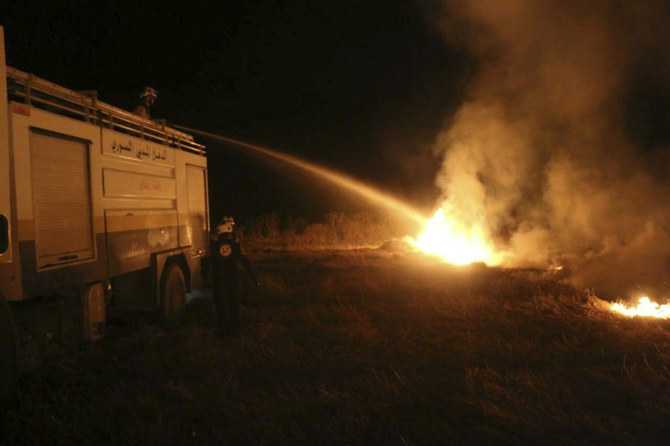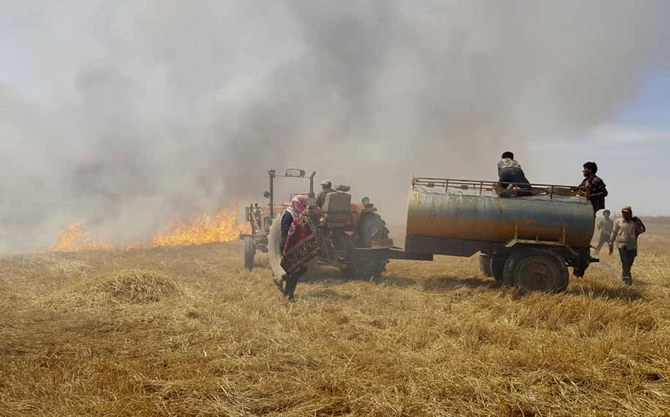IRBIL, Iraq: It was looking to be a good year for farmers across parts of Syria and Iraq. The wettest in generations, it brought rich, golden fields of wheat and barley, giving farmers in this war-torn region reason to rejoice.
But good news is short-lived in this part of the world, where residents of the two countries struggle to cope with seemingly never-ending violence and turmoil amid Syria’s civil war and attacks by remnants of the Daesh group. Now, even in areas where conflict has subsided, fires have been raging in farmers’ fields, depriving them of valuable crops.
The blazes have been blamed alternately on defeated Daesh militants seeking to avenge their losses, or on Syrian government forces battling to rout other armed groups. Thousands of acres of wheat and barley fields in both Syria and Iraq have been scorched by the fires during the harvest season, which runs until mid-June.
“The life that we live here is already bitter,” said Hussain Attiya, a farmer from Topzawa Kakayi in northern Iraq. “If the situation continues like this, I would say that no one will stay here. I plant 500 to 600 acres every year. Next year, I won’t be able to do that because I can’t stay here and guard the land day and night.”
Daesh militants have a history of implementing a “scorched earth policy” in areas from which they retreat or where they are defeated. It’s “a means of inflicting a collective punishment on those left behind,” said Emma Beals, an independent Syria researcher.
Daesh militants claimed responsibility for burning crops in their weekly newsletter, Al-Nabaa, saying they targeted farms belonging to senior officials in six Iraqi provinces and in Kurdish-administered eastern Syria, highlighting the persistent threat from the group even after its territorial defeat.
Daesh said it burned the farms of “the apostates in Iraq and the Levant” and called for more.
“It seems that it will be a hot summer that will burn the pockets of the apostates as well as their hearts as they burned the Muslims and their homes in the past years,” the article said.
Hundreds of acres of wheat fields around Kirkuk in northern Iraq were set on fire. Several wheat fields in the Daquq district in southern Kirkuk burned for three days straight last week.
Farmers in the village of Ali Saray, within Daquq’s borders, struggled to put out the blazes. The militants had laid land mines in the field, so when help arrived in the village of Topzawa Kakayi, the explosives went off and seriously wounded two people, according to the local agriculture department and farmers.
In eastern Syria’s Raqqa province, farmers battled raging fires with pieces of cloth, sacks and water trucks. Piles of hay burned and black smoke billowed above the fields.
The Syrian Observatory for Human Rights said more than 74,000 acres (30,000 hectares) of farmland in Hassakeh, Raqqa and all the way to Aleppo province to the west, were burned.
Activist Omar Abou Layla said local Kurdish-led forces failed to respond to the fires in the province of Deir Ezzor, where Daesh was uprooted from its last territory in March, deepening the crisis.
Other residents accuse the Syrian government, which used to earn millions from the wheat trade in eastern Syria, of sparking the fires to undermine the Kurdish-led administration, which now operates independently of the central government.
Kurdish authorities acknowledge they have few capabilities to deal with the arsons.
In Raqqa, where most of the residents rely on agriculture, farmers were preparing for a good harvest. Ahmed Al-Hashloum heads Inmaa, Arabic for Development, a local civil group that supports agriculture. He said rainfall levels were more than 200% higher than last year, causing many to return to farming.
But what promised to be a good year turned into a “black one,” said Al-Hashloum, who said western Raqqa was worst hit by the fires. All it takes is a cigarette butt to set haystacks on fire, he pointed out.
“It doesn’t need a bomb or fuel,” he said.
Estimates based on local farmers suggest that nearly 25,000 acres (10,000 hectares) in Raqqa province were set on fire, valued at $9 million, he said.
In western Syria, a government military offensive against the country’s last rebel stronghold has also left thousands of acres of farms in ashes, in what activists and experts say is a calculated move to deny the locals livelihood and force them to leave the enclave, home to 3 million people.
Beals, the Syria expert, said the government used similar tactics when it besieged Daraya and eastern Ghouta, other rebel areas outside of the Syrian capital, Damascus, eventually forcing the fighters to surrender as early as 2015 and 2016. Throughout the conflict, various warring parties have used food crops as a way of controlling the population.
Beals said crop burning in rebel-held Idlib province in northern Syria is likely the latest chapter in this playbook and “will impact food security and the ability to eke out a small living for some.” She added that the scale of crop burning is much larger in Idlib than other areas.
One Idlib activist, Huthaifa Al-Khateeb, estimated that as much as 60% of 185,000 acres (75,000 hectares) of wheat and barley have been burned. Olive and pistachio groves have largely been spared, he said.
Satellite images provided by the Colorado-based Maxar Technologies show significant damage to crop fields in Idlib and Hama, calling it a “scorched earth campaign.”
The UN said the fires are threatening to disrupt normal food production cycles and potentially reduce food security for months to come. Whether intentional or collateral damage, crop burning on this scale will damage soil and have adverse effects on the health of civilians in the province, where respiratory diseases are already high in the overcrowded western Syrian enclave.
Syria had suffered a dire pre-war draught that left the country and the region that traded with it in a worsening food insecurity. The crop burning remains localized and can’t be compared to pre-war devastation, Beals said.
“However, it is only the beginning of the summer and if the fires continue it could lead to a crisis,” Beals said.
Crop fires, a weapon of war, ruin Iraqi, Syrian harvests
Crop fires, a weapon of war, ruin Iraqi, Syrian harvests

- Daesh militants have a history of implementing a “scorched earth policy” in areas from which they retreat or where they are defeated
- The blazes have been blamed alternately on defeated Daesh militants seeking to avenge their losses, or on Syrian government forces battling to rout other armed groups
Turkiye evaluating potential measures in event of Iran-US conflict, source says

- Iran and the United States resumed negotiations earlier this month as Washington builds up military capability in the Middle East
ANKARA: Turkiye is evaluating all aspects of potential measures that may be taken in the event of a conflict between its neighbor Iran and the United States, a Turkish diplomatic source told Reuters on Wednesday.
Iran and the United States resumed negotiations earlier this month as Washington builds up military capability in the Middle East. Iran has threatened to strike US bases in the region if it is attacked, but Tehran’s top diplomat said on Tuesday that a deal with the US was “within reach” if diplomacy is prioritized.
NATO member Turkiye, which shares a border with Iran to its east, has said it opposes any military intervention on Iran and does not want destabilization in the region. Ankara has been in contact with both sides to de-escalate tensions and called for a resolution of issues through diplomacy.
“Naturally, all aspects of the measures that could be taken in the event of a negative development are being evaluated,” the source said, speaking on condition of anonymity.
“All scenarios are being considered; and steps that can be taken to ensure the safety of our citizens are being worked on,” the person said, but added any steps that would “violate Iran’s sovereignty” were “out of the question.”
The source did not provide details on what measures Turkiye was evaluating.
Earlier, the Turkish presidency’s office for countering disinformation denied media reports that Turkiye was planning to enter Iranian territory to stop a potential influx of refugees.















